Affordability
While concrete's initial costs can be higher than other materials, its life-cycle costs are much lower. Homeowners are well acquainted with concrete's durability, fire safety, and proven low-maintenance.
Built To Last
Homebuyers prefer concrete driveways by a hefty two-to-one margin, according to a National Family Opinion study of prospective house-hunters. It's no secret as to why. Asphalt sentences homeowners to yearly surface sealing and a lifetime of filling cracks and potholes. But low maintenance is only part of the concrete advantage. It's also an aesthetic upgrade, with options ranging from clean, traditional look to elaborate custom pattern-stamping.
Colors
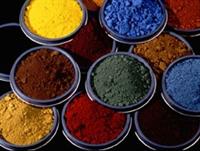 Concrete can be cast in a wide variety of colors. Pastels and earth tones are produced by mixing mineral pigments throughout the concrete. For deeper tones, finishers use the dry-shake method - sprinkling powdered, prepackaged color-hardeners onto a freshly cast concrete slab, then trowelling it into the surface. Precast concrete products, such as pavers and garden stones, are available in the same full palette of colors. See Decorative Floors.
Concrete can be cast in a wide variety of colors. Pastels and earth tones are produced by mixing mineral pigments throughout the concrete. For deeper tones, finishers use the dry-shake method - sprinkling powdered, prepackaged color-hardeners onto a freshly cast concrete slab, then trowelling it into the surface. Precast concrete products, such as pavers and garden stones, are available in the same full palette of colors. See Decorative Floors.
Custom Look At a Lower Cost
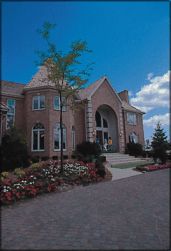 It is true that decorative concrete is more expensive than plain concrete. Coloring and texturing concrete so that it looks like brick of flagstone generally doubles the cost. But using actual brick or flagstone is two to ten times as expensive as using decorative concrete. Concrete creates the same custom look, and gives a better performance, for a fraction of the cost.
It is true that decorative concrete is more expensive than plain concrete. Coloring and texturing concrete so that it looks like brick of flagstone generally doubles the cost. But using actual brick or flagstone is two to ten times as expensive as using decorative concrete. Concrete creates the same custom look, and gives a better performance, for a fraction of the cost.
Exterior Impact
With the exciting new coloring and texturing technologies now at work, concrete can create a cohesive look that begins with driveways and walks that coordinate with the home's exterior, and carries through into patios and retaining walls that blend naturally with their surroundings.
Concrete may be thought of a a gray slab, but more and more often, it also looks like a brick driveway. or a flagstone pool deck. The incredible flexibility of concrete allows it to take on the colors, textures and shapes of other materials. Typically, it is done at a fraction of the cost, and it offers superior long-term performance.
Homescaping with Concrete
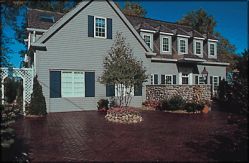 With technological advances that allow it to take on virtually any color, texture or shape, concrete is redefining its role on the residential landscape. Concrete's design flexibility makes it a leading player in a design process that puts increasing emphasis on outdoor space.
With technological advances that allow it to take on virtually any color, texture or shape, concrete is redefining its role on the residential landscape. Concrete's design flexibility makes it a leading player in a design process that puts increasing emphasis on outdoor space.
The only material with the ability to give a coordinated look to all of the home's exterior elements, concrete has become a powerful design tool for "homescaping." That, combined with its affordability, durability, and top-level performance in any climate, makes it the best choice for today's homeowner.
Inexpensive Alternatives
There are plenty of concrete finishes that are ideal for homeowners on a budget. A simple rock salt finish adds an interesting mottled look, and an easy broom finish turns plain concrete into a design feature.
Outdoor Living
Whether it is a patio, pool deck, terrace, or courtyard, homeowners are planning to spend time outdoors. Colored and textured concrete can be used to tie outdoor rooms into the rest of the home. By coordinating a patio's color with the home's interior, it becomes a valuable extension of the home, rather than an afterthought. Concrete garden walkways and retaining walls further enhance the scene.
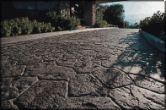 Patterns
Patterns
Semi-hardened concrete can be pattern-stamped with special tools to create the custom look and feel of slate, cobblestone, brick or tile. The patterns can help scale down large expanses of paving.
Stained/Stamped Concrete
Pleasing decorative finishes can be built into concrete during construction. Variations in the color and texture of concrete surfaces are limited only by the imagination of the designer and the skill of the concrete craftsman.
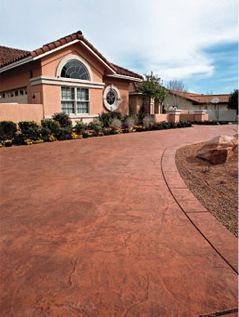 Color may be added to the concrete through the use of white cement and pigments, and by the exposure of colorful aggregates. Textured finishes can be varied as desired, from a smooth polish to the roughness of gravel. Geometric patterns can be scored, stamped, rolled or inlaid into the concrete to resemble stone, brick or tile paving. Divider strips that form panels of various sizes and shapes - rectangular, square, circular or diamond also make interesting patterns. Special techniques are available to make concrete slip-resistant and sparkling. The possibilities are unlimited.
Color may be added to the concrete through the use of white cement and pigments, and by the exposure of colorful aggregates. Textured finishes can be varied as desired, from a smooth polish to the roughness of gravel. Geometric patterns can be scored, stamped, rolled or inlaid into the concrete to resemble stone, brick or tile paving. Divider strips that form panels of various sizes and shapes - rectangular, square, circular or diamond also make interesting patterns. Special techniques are available to make concrete slip-resistant and sparkling. The possibilities are unlimited.
These surface treatments are just as pleasing in the interior as they are on the exterior of a home. Colored and imprinted concrete is an excellent flooring material combining the economy, durability, decorative qualities and strength of concrete and the thermal mass needed for passive solar buildings. From a real estate marketing standpoint, these special concrete finishing - interior or exterior - enhance the prestige and value of any property.
Textures
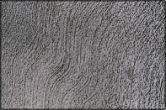 An exposed aggregate finish gives traditional concrete a more natural look. It's done by brushing and washing away surface mortar as the concrete begins to harden, so the stone or gravel in the concrete becomes visible. Any attractive stone can be imbedded into the surface - marble, granite chips, pebbles, or even shells for beachfront property.
An exposed aggregate finish gives traditional concrete a more natural look. It's done by brushing and washing away surface mortar as the concrete begins to harden, so the stone or gravel in the concrete becomes visible. Any attractive stone can be imbedded into the surface - marble, granite chips, pebbles, or even shells for beachfront property.
Concrete Pavers
Potential homebuyers see the outside of the home long before they make it to the kitchen. The exterior appearance can set the tone for the remainder of the visit. By using interlocking concrete pavers, you can increase the attractiveness of your home.
Interlocking concrete pavers can be installed in a variety of patterns - curves, straight lines, intricate designs - to add vitality to any environment. They create style, color and eye-catching patterns while providing a durable and long-lasting surface for driveways, patios, walks, pool decks and entrances. Interlocking concrete pavers tell potential homebuyers that you deliver a quality product.
Pavers are available from local manufacturers in a variety of shapes and a wide range of colors. They can be installed in a multitude of patterns. Typical paver thickness are either 2 3/8 inches or 3 1/8 inches . The thinner pavers are for pedestrian areas and those that receive occasional vehicular traffic, such as driveways. The 3 1/8 in. pavers are for used in streets and other vehicular applications. All units are small enough to be hand-laid by one installer.
Pavers typically exceed 8,000 psi compressive strength, less than 5 percent water absorption and must pass rigorous freeze-thaw structures. ASTM-C396 is the standard specification for interlocking concrete pavers. Pavers can be used as a new pavement or overlay an existing pavement. Once the pavers have been placed and are fully compacted, they are ready for traffic.
Concrete pavers interlock without the use of mortar. This allows the pavement to be "unzipped" for repairs to sub-surface utilities and then "zipped" back using the same paving materials. The original appearance of the paved surface is restored without leaving unsightly patches.
For a successful paver design specification and installation, it is recommended that the specifier consult a local paver producer, a qualified and experienced installation contractor and a soils or pavement engineer, if necessary.
Additional Information
View Focus on Floors section of this website.
Interlocking Concrete Pavement Institute
The Interlocking Concrete Pavement Institute (ICPI) is a self-governed, self-funded, autonomous association representing the interlocking concrete pavement industry in North America.
Interlocking Concrete Pavement Institute
13921 Park Center Rd.
Suite 270
Herndon, VA 20171
703.657.6900 / Fax: 703.657.6901
www.icpi.org
National Concrete Masonry Association
The National Concrete Masonry Association (NCMA) is an organization dedicated to expanding the use of concrete masonry through research, education, promotion, and public affairs work. Contact NCMA to get a complete listing of members.
National Concrete Masonry Association
13750 Sunrise Valley Dr.
Herndon, VA 20171
703.713.1900 / Fax: 703.713.1910
www.ncma.org
Disclaimer
The listing of organizations and information resources constitutes neither an endorsement nor recommendation by the Portland Cement Association (PCA). PCA disclaims any and all responsibility for the selection of organizations listed and the products they represent. PCA also assumes no responsibility for errors and omissions in this list.